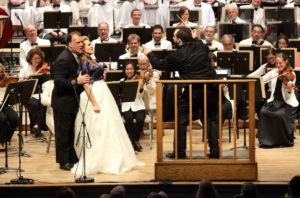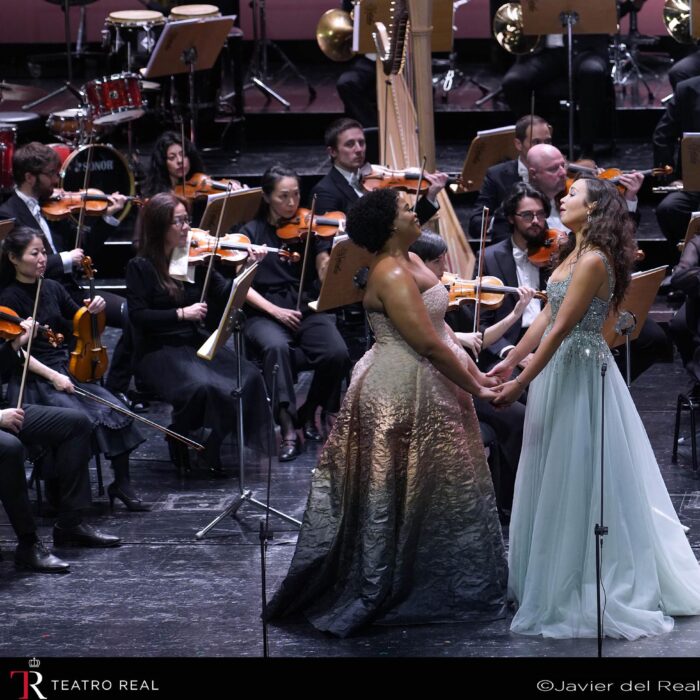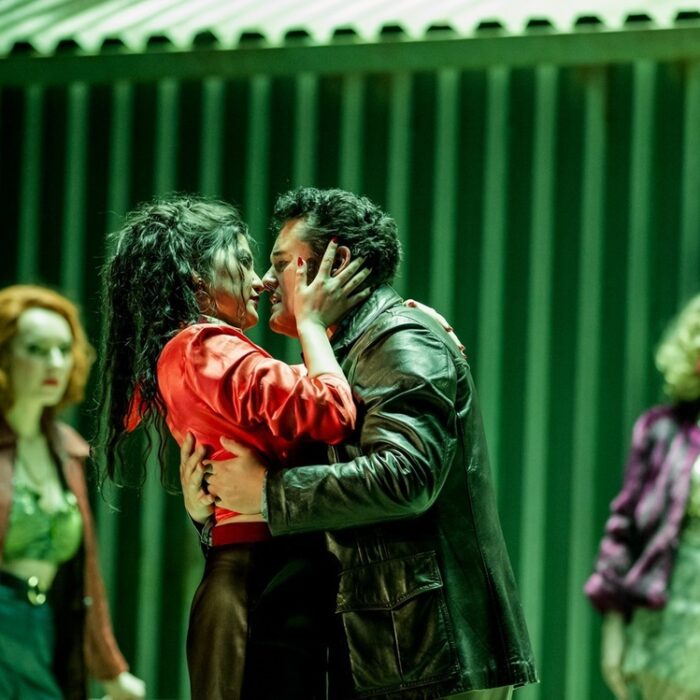
Tanglewood Music Festival 2017 Review: Kristine Opolais, Bryn Terfel, & Andris Nelsons’ Combined Musical Genius Leaves Us Wondering What Could Have Been
By Francisco SalazarOn August 26, 2017, the Tanglewood Music Festival continued with an opera gala featuring Kristine Opolais and Bryn Terfel. Andris Nelsons conducted the Boston Symphony Orchestra in a performance that featured the second act of Puccini’s “Tosca” and a number of arias from “Porgy and Bess” and other opera classics.
The results were delightful and they showcased two artists at the top of their careers.
Tosca
The first half of the concert started off with Act two of Puccini’s “Tosca,” an act that is known for its dramatic power and one demands a true singing actress and actor. In the case of Saturday night’s performance, both Kristine Opolais and Bryn Terfel brought down the house in a powerful semi-staged performance.
Let’s start with Opolais who has become the theme of conversation lately. Her recent “Tosca” in Baden Baden was received poorly and her aria at the Metropolitan Opera gala got mixed reviews. Critics noted that her voice was strained and too small for the role. And then her sudden withdrawal from the Met’s new production of “Tosca” left audiences in shock. In that David McVicar showcase, which debuts on New Year’s Eve, the Latvian soprano was supposed to appear with Nelsons (who also withdrew) and Terfel, who is still scheduled for the production.
For those questioning whether or not her voice was still in good health, I want to report that Opolais was a triumph in the title role, showcasing her talents with flexibility not just as an actress, but also vocally. From her first entrance off stage, one heard Opolais’ glowing voice over the immense chorus as she sang the cantata. Then came her show-stopping “Vissi d’arte” and that was a true display of vocal fireworks as Opolais sang with a sense of desperation, moving the tempo forward, all while lying on kneeling on the floor. It was a true plea as the voice continuously crescendoed until it rose to a true forte in the words “Signor” hitting the high B flat perfectly.
Moreover, her chemistry with Bryn Terfel was unmatchable. From the start of the act, the soprano showcased strength, mixed with some fear and loathing for Terfel’s villainous interpretation. When it came time for her vocal outcries, she didn’t care to make it ugly and raw, emoting some of the text. It only made Tosca’s desperation seem more vivid and real. And when Terfel fawned all over her, she had no qualms with pushing him away in the small little space. But the clincher came when Tosca killed Scarpia. Opolais’ face was filled with fear, but as Terfel moved toward her, she took the knife and stabbed him the neck. Her voice was full of power as she sang her final lines triumphantly.
Terfel, of course, held his own against her, making the battle of wills all the more visceral. At the beginning of the concert, he walked on stage, already in character sipping his wine. This was an ominous Scarpia who meant business. There was a gritty quality to his timbre but at the same time, he kept a suave tone that allowed audiences to see and hear the manipulative character. And that was even more evident as he grabbed Opolais’ Tosca, looming over her and emphasizing his lust for her through the text. Anytime Terfel approached Opolais it was like a wolf seeking his prey and any sexual advances he could make, he did.
It is a shame U.S. audiences won’t be seeing these two in a full production of “Tosca.” One could only imagine how riveting these two would be in the complete opera.
Unfortunately, Russell Thomas, one of the most exciting tenors out there, was unable to impress, as he was suffering from a throat infection. The spinto tenor, whose voice generally gleams with power and force, sounded muffled. Throughout this act, the role of Cavaradossi is asked to hold extended long notes and while Thomas was able to do it, particularly in the climactic “Vittoria, Vittoria,” the rest of the passages were barely audible and it sounded like his voice was weakened.
As Spoletta Matthew DiBautista sang with conviction, while Douglas Williams gave Sciarone an ominous stance.
Nelsons may have conducted with slower tempi than one would expect, but it helped emphasize some of the dramatic force of Puccini’s orchestrations. From the lower instruments in the orchestra, one could sense the ominous scene and Nelsons’ emphasize on rhythm allowed audiences to hear the turbulence suffered by Tosca.
The Second Half
The second half of the concert was dedicated to showcasing Terfel and Opolais and the BSO, as well as the Tanglewood Festival Chorus.
The half opened with the “Entrance of the Guests” from “Tannhäuser” and under the direction of Nelsons, the chorus sang with rousing energy, filling the hall with vitality. The chorus also got to accompany the soloists in two pieces from “Porgy and Bess” and during the introduction and Jasbo Blues, the ensemble whispered slowly, adding more volume gradually.
The orchestra also got to showcase its abilities in the Polonaise from “Rusalka.” Nelsons conducted a refined and elegant piece, always giving a sense of forwardness. In the introduction from “Porgy and Bess” there was also a piano solo that allowed the orchestra’s resident pianist to showcase his improv skills and virtuosity.The second half also included two arias for Opolais and Terfel. In her first selection, the “Song to the Moon” from “Rusalka,” Opolais showcased a creamy voice with each phrase melting into the next, creating a mystical atmosphere. The connected phrases blended well with the orchestra as Nelsons conducted with a sturdy and quick pace that brought through the Slavic tones of Dvorak.
The second half also included two arias for Opolais and Terfel. In her first selection, the “Song to the Moon” from “Rusalka,” Opolais showcased a creamy voice with each phrase melting into the next, creating a mystical atmosphere. The connected phrases blended well with the orchestra as Nelsons conducted with a sturdy and quick pace that brought through the Slavic tones of Dvorak.
Her “Summertime” from “Porgy and Bess” saw the soprano’s higher register shine. It also displayed how easily Opolais adapted to the jazzier style as she sang with a free-flowing legato, her voice almost swaying.
As for Bryn Terfel, it was hard to look away. His Hans Sachs “Flieder-Monologue” from “Die Meistersinger” was sung with such conviction, telling a story with each word and phrase. It was Bel Canto singing the way Wagner would have liked to hear his music performed. But it was his aria “I got Plenty o’nuttin” from “Porgy and Bess” that was showstopping. Here Terfel was sly, flirtatious and just enjoying himself with the upbeat score.
At the end of the concert Terfel and Opolais reunited for the duet “Bess, you is my woman now.” The two showed tremendous chemistry yet again, this time flirting instead of killing each other. Opolais first rejected Terfel but eventually took to his advances, her expressive face telling us everything. Their voices matched with each line as the swooning orchestral lines crescendoed and they phrased the music with gusto. Opolais’ soft and smooth tone was a great contrast to Terfel’s gruffer timbre.
Once they finished, it was obvious the audience wanted more. And they got just that.
Opolais and Terfel encored with “La Ci darem la Mano.” However, this time around Nelsons joined in. Terfel’s tone now smooth and gentle made advances on Opolais as he tried to seduce her with his beautiful voice. And Opolais showed a gentle tone as she flirted with him. But at one point, Nelsons joined in and a sang a few lines. And when Terfel was unable to seduce her, he kicked Nelsons off the podium and began conducting. Opolais and Nelsons looked astonished but they continued singing the duet. Eventually, the Maestro took back the podium and Opolais and Terfel sang through the rest of the duet. At the end when Terfel sang the lines “Andiam,” the soprano looked confused where to go. But she made her choice and while Terfel left the stage she embraced her husband Nelsons. The moment produced laughter throughout the audience and it is was also the best way to end a delightful summer concert.
Ultimately, the Opera Gala was a delightful evening filled with drama, laughter and simply put amazing music-making.
It also left wondering about what could have been this New Year’s Eve.


